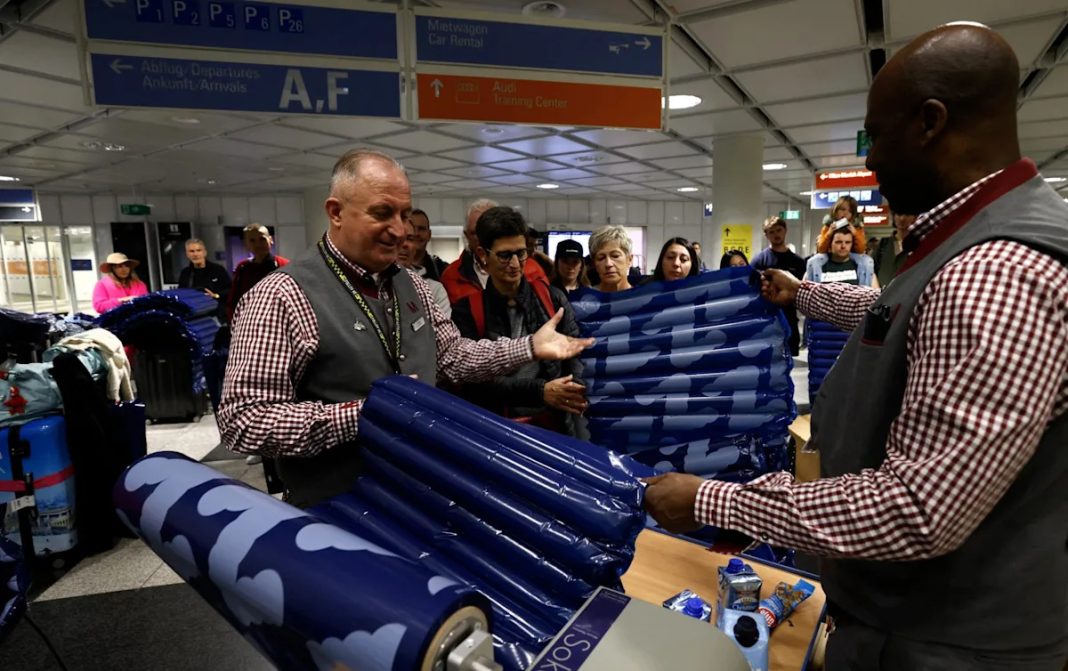Military reconnaissance drones were behind the closure of Munich airport for the second night in a row, reports in Germany have said.
The airport, one of Germany’s largest, was forced to ground flights late on Thursday and Friday before reopening from 7am local time (6am BST) on Saturday.
It was the latest in a series of mysterious drone overflights in European Union airspace and Nato member countries.
Suspicion has fallen on Russia after marine tracking data recorded a vessel – believed to be part of Moscow’s so-called ‘Shadow Fleet’ – operating in the seas around Denmark and Norway at the same time airports were forced to shut down there late last month.
Bild newspaper, which said it had obtained a classified report, said on Saturday that the drones responsible for the disruption in Munich were military reconnaissance drones, suggesting they were not drones that could be purchased off-the-shelf.
The German armed forces (Bundeswehr) said it had been supporting Munich airport since Friday “in the area of drone detection”.
Flights were grounded at Munich airport on Thursday and Friday – MICHAELA STACHE/AFP
A police helicopter was sent to the Bavarian airport to patrol the skies.
“The helicopter is circling Munich airport’s airspace for security purposes due to the drone incidents,” an airport spokesman told the German tabloid.
The drones were spotted shortly before 11pm on Friday, with a police spokesman saying: “One drone each was spotted at the same time, both on the north and south runways… the drones immediately turned around and disappeared, so they could not be identified.”
Munich is about 180 miles from the nearest sea, suggesting the UAVs were land-launched. Stefan Bayer, another Munich police spokesman, said they had not been able to identify where from.
Drone sightings
Earlier this week, it was reported that suspicious drones were seen over Erding, a town a few kilometres away from the airport.
A drone incident also occurred at Frankfurt airport overnight, officials said. A 41-year-old Croatian man was arrested and is being investigated.
Germany is also investigating Russia’s involvement in a swarm of drones seen spying on a power plant, hospital and military shipyard in the north of the country around Sept 25.
At least 6,500 passengers were impacted by the overnight airport closure from Friday into Saturday, Munich airport said.
Germany operates a night-time flight ban to avoid noise disturbance for residential areas, meaning that evening drone incursions are particularly disruptive at its airports.
Photographs published by German newspaper Die Welt showed rows of passengers lying on sleeping bags on Friday night due to the disruption.

Stranded passengers were given inflatable mattresses to sleep at the airport – MICHAELA STACHE/AFP
The airport also provided stranded passengers with camper beds, so they could sleep there until flights resumed the following morning.
“Camp beds were set up, and blankets, drinks, and snacks were distributed,” a Munich airport spokesman said.
In total, 23 incoming flights were diverted and 12 were cancelled, while 46 departing flights were also cancelled.
Drone defence systems
German politicians have called for a new system to tackle drones following the disruption.
“We urgently need a functioning drone defence system,” Herbert Reul, North Rhine-Westphalia’s interior minister from the centre-Right Christian Democrats party, told German news agency DPA.
“Our security authorities must become more capable and more modern.”
There have been a series of drone sightings over airports as well as other critical infrastructure sites in several European Union member countries.
Drones were spotted above a military base in Belgium overnight.
A drone incident in Oslo, the capital of Norway, which is a Nato member but not part of the EU, also affected flights there late last month.
It was not immediately clear who was behind the flyovers.
Tracking data for the Boracay, an 18-year-old tanker sanctioned for being part of Russia’s shadow fleet, showed that it left Russia on Sept 20 and sailed through the Baltic, where a string of mysterious swarms of drones were launched over the past two weeks.
A Telegraph analysis of tracking data put the ship at the scene of the unexplained drone incursions, which Western leaders have warned are part of Moscow’s hybrid war against Nato and its allies.
However, that would not explain the Munich disruption on account of the airport’s distance from the sea.
Some experts have noted that anybody with drones could be behind them. Russian authorities have rejected claims of involvement, including in recent drone incidents in Denmark.
Alexander Dobrindt, Germany’s interior minister, said he and some European counterparts would discuss the drone incursions, and a “drone detection and defence plan” at a meeting this weekend in Munich.

